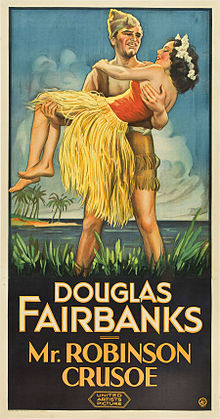- Mr. Robinson Crusoe
-
Mr. Robinson Crusoe 
movie posterDirected by A. Edward Sutherland Produced by Douglas Fairbanks Written by Douglas Fairbanks (story)
Thomas J. Geraghty (adaptation)Music by Alfred Newman Cinematography Max Dupont Editing by Robert Kern Distributed by United Artists Release date(s) 19 August 1932 Running time 76 minutes
70 minutes (American DVD)
66 minutes (Ontario, Canada)Country United States Language English Mr. Robinson Crusoe is a 1932 American film. It is one of the few "talkie" films starring Douglas Fairbanks in his penultimate film role, who also produced the film and provided the story. The film was directed by A. Edward Sutherland, a veteran silent film director, for Fairbanks's Elton Productions, and released by United Artists. Steve Drexel (played by Fairbanks) shows a fiery optimism and can-do spirit that matches the Fairbanks screen persona that appears in his most popular films.
The South Seas comedy adventure featured location filming on Tahiti[1] with working titles being Tropical Knight, A Modern Robinson Crusoe and Robinson Crusoe of the South Seas.
Contents
Plot summary
The film opens with a title card that reads "From the time Adam and Eve were banished from the Garden of Eden, man has vainly sought to find solace, comfort and earthly pleasures in an artificial world of his own creation. Down through the ages has come that eternal heritage of the urge in every man to turn his back on so-called civilization, to get back to nature and revel in the glories and freedom of a primitive paradise."
The Fairbanks character Steve Drexel voluntarily strands himself on a deserted island on a bet. He intends to re-create civilization (in the form of New York) and carves a miniature city of 52nd Street and Park Avenue out of the jungle. Drexel is befriended by his dog, a native monkey, and a wild goat that is captured in one of his traps. He attempts to cultivate a native as his Man Friday from Robinson Crusoe, but fails as the native escapes.
A woman played by actress Maria Alba is trapped in one of his devices. He names her Saturday and she becomes the love interest of the film. In an attempt to communicate with Saturday, he tries German, Spanish, and then Pig Latin. Over the course of the film, she slowly learns rudimentary English.
Eventually, the hostile natives on a nearby island attack the Fairbank's settlement at the behest of the men that bet against the main character. The hero defeats the hostile natives, but ends up escaping with the girl on the yacht that brought him there. He takes her back to New York where she performs to an appreciative crowd in the Ziegfeld Follies.
Self Reliance
The lead character exemplifies the can-do spirit of early twentieth-century America. Drexel launches his subjugation of the jungle by creating construction tools including an axe made from a sharpened shell lashed to a wooden branch. He uses the axe to make a shovel, plow, bow, arrows, saw, table, and many more items.
Drexel speaks to a monkey in much the same way Tom Hanks speaks to the soccer ball in the later film Cast Away. He explains to the monkey he learned his survival skills from his time in the Boy Scouts of America and Dan Beard's American Boy's Handy Book. At the time, the book was a popular young adult wilderness and outdoor survival skills manual.
In recreating civilization, the main character even creates an 18-hole golf course on the island.
Cast
- Douglas Fairbanks as Steve Drexel
- William Farnum as William Belmont
- Earle Browne as Professor Carmichale
- Maria Alba as Saturday
Soundtrack
During the filming the sound equipment failed and the film had to be dubbed back in California.[2]
Alfred Newman who had previously scored Fairbanks' Reaching for the Moon composed the score. Newman reused one of his musical themes for the 1937 film The Hurricane where it became a popular song called Moon of Manakoora.[3]Newman's scorre for The Hurricane was nominated for an Academy Award.
Notes
- ^ http://www.tcm.com/tcmdb/title/83742/Mr-Robinson-Crusoe/notes.html
- ^ p.293 Vance, Jeffrey; Maietta, Tony and Cushman, Robert Douglas Fairbanks University of California Press, 2008
- ^ p.295 Vance, Maietta & Cushman
External links
- Mr. Robinson Crusoe at the Internet Movie Database
- Mr. Robinson Crusoe is available for free download at the Internet Archive [more]
- "Robinson Crusoe" by Douglas Fairbanks http://books.google.com/books?id=4Z0lb8rCiecC&pg=PA31&dq=%22mr+robinson+crusoe%22+%2B+%22douglas+fairbanks%22&hl=en&ei=Y6yLTtv6AuiMmQWK-s2PBA&sa=X&oi=book_result&ct=result&resnum=2&ved=0CDsQ6AEwAQ#v=onepage&q=%22mr%20robinson%20crusoe%22%20%2B%20%22douglas%20fairbanks%22&f=false
- Public domain download of Mr. Robinson Crusoe
- The text of American Boy's Handy Book at inquiry.net
Films directed by A. Edward Sutherland 1920s Coming Through (1925) · Love's Greatest Mistake (1927) · Fireman, Save My Child (1927) · Tillie's Punctured Romance (1928) · Close Harmony (1929) · The Dance of Life (1929) · The Saturday Night Kid (1929) · Fast Company (1929) · Pointed Heels (1929)1930s Up Pops the Devil (1931) · Palmy Days (1931) · Mr. Robinson Crusoe (1932) · Murders in the Zoo (1933) · International House (1933) · Too Much Harmony (1933) · Mississippi (1935) · Diamond Jim (1935) · Every Day's a Holiday (1937) · The Flying Deuces (1939)1940s Beyond Tomorrow (1940) · The Boys from Syracuse (1940) · One Night in the Tropics (1940) · The Invisible Woman (1940) · Nine Lives Are Not Enough (1941) · The Navy Comes Through (1942) · Dixie (1943) · Follow the Boys (1944) · Secret Command (1944)Categories:- American films
- English-language films
- 1932 films
- 1930s comedy films
- 1930s adventure films
- Black-and-white films
- Castaways
- Films directed by A. Edward Sutherland
- Films set in Oceania
Wikimedia Foundation. 2010.
